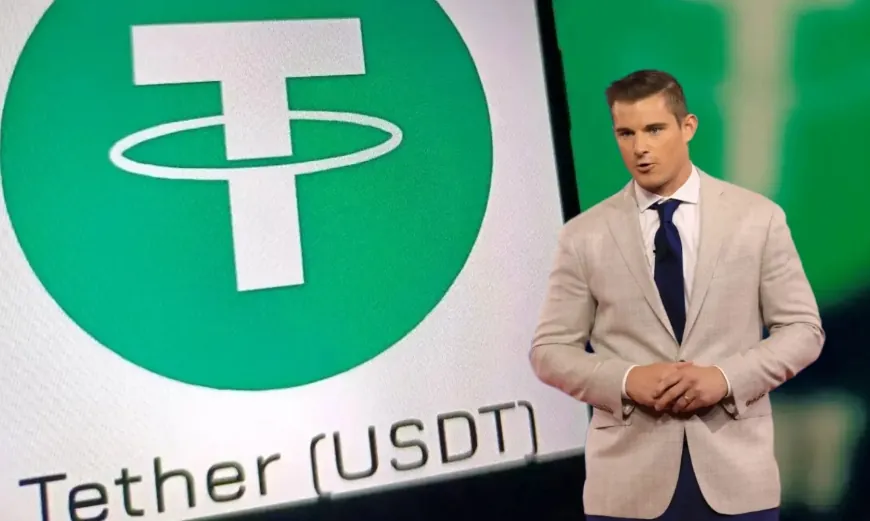Tether Appoints Former White House Crypto Adviser Bo Hines for U.S. Market Expansion
Cryptocurrency firm Tether has hired Bo Hines, ex-White House crypto policy executive, as strategic adviser to guide U.S. market strategy and stablecoin regulatory engagement.

Cryptocurrency company Tether has announced the appointment of Bo Hines, a former senior White House crypto policy executive, as a strategic adviser to guide its growth and regulatory initiatives in the United States. The move, revealed on Tuesday, signals Tether’s determination to strengthen its presence in the world’s largest cryptocurrency market, where regulatory clarity and adoption are accelerating.
In his new role, Hines will advise Tether on U.S. market strategy and digital asset initiatives, working closely with regulators, policymakers, and industry groups. His responsibilities will include providing insights into legislative developments, shaping Tether’s compliance and engagement strategies, and advising on stablecoin initiatives. “Bo’s understanding of the legislative process, coupled with his practical approach to blockchain adoption, makes him an invaluable partner as Tether scales its U.S. operations,” said Tether CEO Paolo Ardoino.
Hines brings extensive experience from his tenure as executive director of the Presidential Council of Advisers for Digital Assets, where he contributed to the development of the GENIUS Act—a regulatory framework designed specifically for stablecoins. He also helped shape broader cryptocurrency policies aimed at fostering innovation while ensuring consumer protection and financial stability. After stepping down from his White House role in August, Hines decided to re-enter the private sector to continue influencing the industry from a commercial perspective.
“Serving in public office offered me a front-row view of the transformative potential of stablecoins,” Hines said. “These digital assets have the ability to modernize payment systems, reduce transaction costs, and expand financial access for communities that have traditionally been underserved by conventional banking.”
Stablecoins, digital tokens pegged to assets such as the U.S. dollar, have emerged as one of the most widely used categories of cryptocurrency. They are prized for their stability compared with more volatile cryptocurrencies like Bitcoin or Ethereum, making them a preferred medium for payments, remittances, and decentralized finance (DeFi) applications. As regulatory guidance becomes clearer, investor confidence in stablecoins is growing, encouraging firms like Tether to expand their U.S. operations.
Tether is already one of the largest stablecoin issuers globally, with its USDT token widely used across exchanges, trading platforms, and payment networks. By appointing Hines, Tether gains a strategic advantage in navigating complex U.S. regulatory landscapes, engaging with lawmakers, and anticipating future policy changes. His experience is expected to help the firm implement best practices in compliance while advocating for policies that support the growth of the digital asset ecosystem.
Tether’s decision to bring Hines on board comes as U.S. regulators increasingly scrutinize stablecoins and other digital assets. Industry insiders say having advisers who have navigated government policy firsthand can be crucial for firms aiming to operate smoothly while staying compliant. Hines’ direct experience with the GENIUS Act and broader crypto policy gives Tether a rare advantage: someone who understands not only the letter of proposed rules but also how regulators interpret them in practice.
Beyond regulatory guidance, Hines is expected to help Tether identify concrete business opportunities in the U.S. market. This includes advising on partnerships with banks and payment processors, exploring avenues for institutional adoption, and guiding technical teams on compliance-ready infrastructure. People familiar with the matter say that such hands-on insights are in high demand, as stablecoins increasingly move from niche trading tools to components of mainstream financial transactions.
Tether’s USDT has already become one of the most widely used stablecoins globally, and the U.S. remains a key growth market. With Hines’ guidance, Tether is looking to expand its reach in payment systems, merchant services, and cross-border settlements, while navigating a regulatory landscape that continues to evolve rapidly. Analysts note that these efforts could also influence broader discussions on how digital assets are integrated into traditional finance, potentially setting standards for other stablecoin issuers in the U.S.
Also Read: Tether Is the Biggest Stablecoin—But Should You Use It or Avoid It?
































































